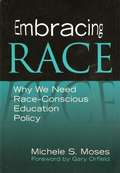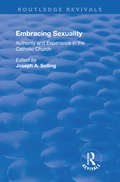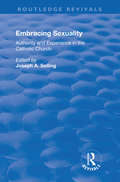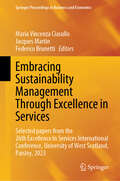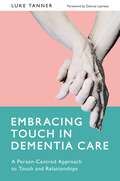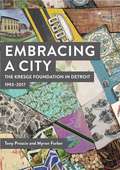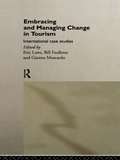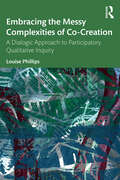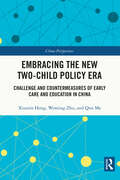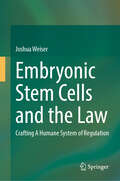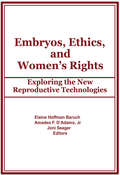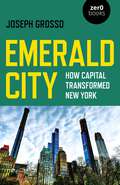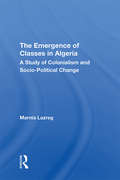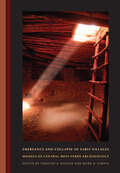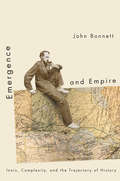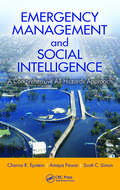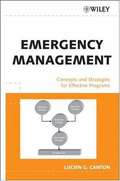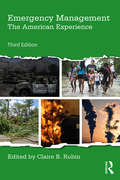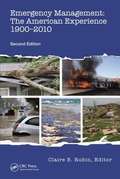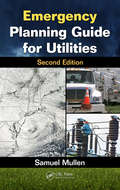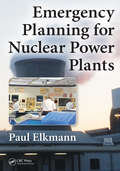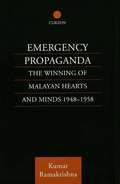- Table View
- List View
Embracing Sexuality: Authority and Experience in the Catholic Church (Routledge Revivals Ser.)
by Joseph SellingThis title was first published in 2001. This text examines sexuality and interpersonal relationships in relation to the Catholic Church. Topics discussed include spirituality; sexuality; bodiliness and sacramentality; the female experience of sexuality; authority; and the development of Catholic tradition and sexual morality.
Embracing Sexuality: Authority and Experience in the Catholic Church (Routledge Revivals)
by Joseph A. SellingThis title was first published in 2001. This text examines sexuality and interpersonal relationships in relation to the Catholic Church. Topics discussed include spirituality; sexuality; bodiliness and sacramentality; the female experience of sexuality; authority; and the development of Catholic tradition and sexual morality.
Embracing Sustainability Management Through Excellence in Services: Selected papers from the 26th Excellence In Services International Conference, University of West Scotland, Paisley, 2023 (Springer Proceedings in Business and Economics)
by Maria Vincenza Ciasullo Jacques Martin Federico BrunettiThis book provides a comprehensive overview, including critical aspects of and opportunities for effective sustainability management in today’s unpredictable and fragile business landscapes. Presenting the outcomes of the 26th Excellence in Services International Conference, held in Paisely, UK, on August 31–September 1, 2023, the book brings together both selected research contributions and numerous best-practice examples in sustainability management. As such, it will help managers to improve their sustainability-related decision-making processes at various levels of the business ecosystem and integrate service excellence as a new way of thinking.
Embracing Touch in Dementia Care: A Person-Centred Approach to Touch and Relationships
by Danuta Lipinska Luke TannerMeaningful touch is an essential part of truly person-centred dementia care, yet its value is often viewed as secondary to its perceived risks. This book restores trust in the power of touch, demonstrating the vital role it plays in supporting personhood, relationships and wellbeing, and challenging the barriers preventing staff from using touch in meaningful ways. Using many examples from practice, Luke Tanner demonstrates that touch and other forms of non-verbal communication are essential for 'being with' and not just 'doing to' people living with a dementia, and explains how and when to use touch effectively in everyday interactions, and in all stages of dementia. He places touch in the context of consent and safeguarding, whilst emphasising the need for positive attitudes to touch to be at the heart of care cultures. Offering perspectives, ideas, training exercises and culture change actions to maximise the benefits of touch in dementia care settings, this practical guide will enable practitioners to reflect on their own use of touch and develop the knowledge, skills and confidence to place meaningful touch at the heart of their work.
Embracing a City, The Kresge Foundation in Detroit: 1993-2017
by Tony Proscio M. A. FarberThe book provides a behind-the-scenes look into the unlikely partnerships, unique collaborations, variety of financial tools and bold bets led by The Kresge Foundation during a 13-year period in Detroit to foster a sustainable and equitable recovery for the city and all of its residents. The authors originally imagined the book contents as four individual case studies. In preparation, they performed an exhaustive review of Kresge Foundation historical documents and a comprehensive scan of media coverage and journalistic commentary about Detroit’s recovery. They also conducted more than four dozen interviews with the individuals who participated in, witnessed or otherwise impacted the changing tide in the city of Detroit during this period. Once assembled, the authors agreed that – assembling together in context with one another – the content could serve as an important snapshot of some of the positive forces and extreme undercurrents at play in Detroit during this extraordinary time in the city.
Embracing and Managing Change in Tourism: International Case Studies
by Gianna Moscardo Eric Laws Bill FaulknerEmbracing and Managing Change in Tourism examines management responses to the major changes taking place in international tourism and considers tourism itself as an agent of change. Including twenty-two detailed case studies from around the world this book explores two key principles. Firstly that change is enevitable and, if effectively managed, has the potential to benefit all those living in, working in and visiting the destination. Secondly, that there are no universal prescriptions for the effective management of change in tourism, since each destination has distinguishing characteristics and the nature of the problems facing it change over time.
Embracing the Messy Complexities of Co-Creation: A Dialogic Approach to Participatory Qualitative Inquiry
by Louise PhillipsCo-creation in participatory, qualitative research has become commonplace. It supports a myriad of collaborative practices – from service-user involvement in health and social care, to community capacity-building, to bottom-up climate change projects. With its democratic ambitions, transformative power and (in some contexts) goals of social justice, co-creation has much to offer, particularly in these challenging times… but it is also complex and full of tensions.This book offers an approach which recognises - and embraces - the messy complexities of co-creation. The approach is constructive – it revolves around creating openings for multiple voices; and, in particular, the voices of people with lived experience. And it is critical – it involves integrating critical, reflexive analyses of the intrinsic tensions in co-creation into the practice of research. The book brings participatory research into dialogue with poststructuralist, social constructionist and new materialist, posthumanist strands of qualitative inquiry. In an engaging and accessible way, the author weaves together personal storytelling and more detached analysis to illustrate her approach to producing and communicating knowledge as intertwined processes.The book is written for all students and researchers with an interest in collaborative research practice.
Embracing the New Two-Child Policy Era: Challenge and Countermeasures of Early Care and Education in China (China Perspectives)
by Xiumin Hong Wenting Zhu Qun MaCrafted from a research project that lasted for three years, this book examines the impacts of China’s universal two-child policy under the lens of education and focuses specifically on early childhood. This book not only provides number projection, but also the prediction and judgment of the supply and demand of service resources in early childhood education. It attempts to reveal the attitudes and views of families and stakeholders on the universal two-child policy and present the public's policy requirements for the quality of early childhood education. In addition, it analyses possible problems and challenges in current kindergarten layouts and resources allocation. Lastly, it aims to provide references and bases for formulating the plan that adapts to changes of Chinese preschoolers, supply guarantee of future early childhood education and the construction of public service system. Offering rich insights into the current and future status of education in China, this text will be of interest to students, scholars, and researchers of sociology, early childhood education, contemporary China studies, East Asian educational practices and policy.
Embryonic Stem Cells and the Law: Crafting A Humane System of Regulation
by Joshua WeiserThis book deals with the research and use of embryonic stem cells to combat a number of diseases and the legal limitations, arising mostly from bioethical concerns regarding human life. Using the New Haven problem and policy-oriented method of jurisprudence, the author thoroughly explains the scientific and technological parameters and promise of this medical innovation and its alternatives as well as the conflicting claims and past decisions regarding its legal and moral acceptability in international and comparative perspective. International law, EU and regional human rights law, as well as individual countries’ laws across the globe are covered, ending with American law on the federal and state levels. The book concludes with a recommendation of humane regulation, and a draft federal statute as a model form of regulation that would allow the beneficial research and use of this technology.
Embryos, Ethics, and Women's Rights: Exploring the New Reproductive Technologies
by Elaine Baruch Joni Seager Amadeo F D'AdamoWill procreation become just another commodity in the marketplace with “designer” sperm, ova, and embryos offered for sale? Will the attention and monies focused on the new reproductive technologies take away resources from infertility prevention, prenatal care, and adoption? If states move to regulate such practices, will this encourage widespread governmental interference in reproductive choice? How will society look at the biologically unique children who are the products of genetic manipulation--and more importantly, how will these children view themselves?This controversial book explores the answers to these questions that are frequently being asked as the battles over reproductive technologies and freedoms become more heated and touch more people’s lives. Embryos, Ethics, and Women’s Rights examines both the clinical and personal perspectives of reproductive technologies. Experts explain and debate the growing number of procreative possibilities--in vitro fertilization, genetic manipulation of embryos, embryo transfer, surrogacy, prenatal screening, and the fetus as patient. Some of the leading authorities in the field, including John Robertson, Ruth Hubbard, and Gena Corea, address the ethical, legal, religious, social, and psychological concerns that are inherent in the issues.Essential reading for every person concerned with control over basic issues of human destiny, Embryos, Ethics, and Women’s Rights provides unique and comprehensive coverage on the subject of technologically controlled childbearing and particularly its effects on mothers and their unborn children.
Emeka's Gift: An African Counting Book
by Ifeoma OnyefuluAs a young African boy travels to visit his grandmother, he passes through the village market, where he sees lots of things Granny would like -- four brooms, five hats, six necklaces, seven musical instruments, and so on. Stunning photographs taken in Emeka's southern Nigerian village illustrate this heartwarming story. The pages in this book are not numbered. Other books by this author are available in this library.
Emerald City: How Capital Transformed New York
by Joseph GrossoFresh, lively, accessible, Grosso brings the issues of gentrification, deindustrialization, homelessness, and militarized policing, so easily ignored, to the fore.Joseph Grosso traces the history of New York's transformation back into a gilded city, and asks what can be done about it. He examines New York's deindustrialization and the elite planning and design that followed; New York's financial crisis of the mid-1970s and the policy decisions made in its wake; New York's housing crisis; and the history of public housing across the United States. Making the history of gentrification and deindustrialization widely available and understood is a crucial tool in combating housing crises which continue to spread in cities around the world as more and more houses are left empty, to be used for global investments instead of for living.
Emergence Classes Alg/h
by Marnia LazregThis book seeks to determine the impact of colonialism on the evolution of social classes in Algeria from 1830 to the present, and to analyze the relationship between classes and political and economic development.
Emergence and Collapse of Early Villages: Models of Central Mesa Verde Archaeology (Origins of Human Behavior and Culture #6)
by Timothy A. Kohler Mark D. VarienAncestral Pueblo farmers encountered the deep, well watered, and productive soils of the central Mesa Verde region of Southwest Colorado around A.D. 600, and within two centuries built some of the largest villages known up to that time in the U.S. Southwest. But one hundred years later, those villages were empty, and most people had gone. This cycle repeated itself from the mid-A.D. 1000s until 1280, when Puebloan farmers permanently abandoned the entire northern Southwest. Taking an interdisciplinary approach, this book examines how climate change, population size, interpersonal conflict, resource depression, and changing social organization contribute to explaining these dramatic shifts. Comparing the simulations from agent-based models with the precisely dated archaeological record from this area, this text will interest archaeologists working in the Southwest and in Neolithic societies around the world as well as anyone applying modeling techniques to understanding how human societies shape, and are shaped by the environments we inhabit.
Emergence and Empire: Innis, Complexity, and the Trajectory of History
by John BonnettHarold Innis was one of the most profound thinkers that Canada ever produced. Such was his influence on the field of communication that Marshall McLuhan once declared his own work was a mere footnote to Innis. But over the past sixty years scholars have had a hard time explaining his brilliance, in large measure because Innis's dense, elliptical writing style has hindered easy explication and interpretation. But behind the dense verbiage lies a profound philosophy of history. In Emergence and Empire, John Bonnett offers a fresh take on Innis's work by demonstrating that his purpose was to understand the impact of self-organizing, emergent change on economies and societies. Innis's interest in emergent change induced him to craft an original and bold philosophy of history informed by concepts as diverse as information, Kantian idealism, and business cycle theory. Bonnett provides a close reading of Innis's oeuvre that connects works of communication and economic history to present a fuller understanding of Innis's influences and influence. Emergence and Empire presents a portrait of an original and prescient thinker who anticipated the importance of developments such as information visualization and whose understanding of change is remarkably similar to that which is promoted by the science of complexity today.
Emergencies and Politics
by Tom SorellIn this book Tom Sorell argues that emergencies can justify types of action that would normally be regarded as wrong. Beginning with the ethics of emergencies facing individuals, he explores the range of effective and legitimate private emergency response and its relation to public institutions, such as national governments. He develops a theory of the response of governments to public emergencies which indicates the possibility of a democratic politics that is liberal but that takes seriously threats to life and limb from public disorder, crime or terrorism. Informed by Hobbes, Schmitt and Walzer, but substantially different from them, the book widens the justification for recourse to normally forbidden measures, without resorting to illiberal politics. This book will interest students of politics, philosophy, international relations and law.
Emergency Action for Chemical and Biological Warfare Agents
by D. Hank EllisonEmergency Action for Chemical and Biological Warfare Agents, Second Edition is intended for the first responder to the scene of the release of a chemical or biological warfare agent. Formatted similarly to the Department of Transportation‘s Emergency Response Guidebook and designed as a companion to the author‘s Handbook of Chemical and Biological
Emergency Management and Social Intelligence: A Comprehensive All-Hazards Approach
by Charna R. Epstein Ameya Pawar Scott. C. SimonFor effective preparedness, emergency managers must comprehend how a disaster impacts not only the physical infrastructure of the affected community but also the population. They must understand how the people interact with one another, how they interact with government, and how they react to the disaster event. In other words, they must have socia
Emergency Management: Concepts and Strategies for Effective Programs
by Lucien G. CantonThis book propounds an all-hazards, multidisciplinary approach to emergency management. It discusses the emergency manager’s role, details how to establish an effective, integrated program, and explores the components, including: assessing risk; developing strategies; planning concepts; planning techniques and methods; coordinating response; and managing crisis. Complete with case studies, this is an excellent reference for professionals involved with emergency preparedness and response.
Emergency Management: The American Experience
by Claire B. RubinThe spate of disaster events ranging from major to catastrophic that have occurred in recent years raises a lot of questions about where and why they happened. Understanding the history of emergency management policies and practice is important to an understanding of current and future policies and practice. Continuing in the footsteps of its popular predecessors, the new edition of Emergency Management: The American Experience provides the background to understand the key political and policy underpinnings of emergency management, exploring how major "focusing events" have shaped the field of emergency management. This edition builds on the original theoretical framework and chronological approach of previous editions, while enhancing the discussions through the addition of fresh information about the effects and outcomes of older events, such as Hurricane Katrina and the BP oil spill. The final chapters offer insightful discussion of the public administration concepts of emergency management in the U.S. and of the evolving federal role in emergency management. Like its predecessors, the third edition of Emergency Management is a trusted and required text to understand the formation and continuing improvement of the American national emergency management system.
Emergency Management: The American Experience 1900-2010 (Second Edition)
by Claire B. RubinFollowing in the footsteps of its popular predecessor, the second edition of Emergency Management: The American Experience 1900–2010 provides the background needed to understand the key political and policy underpinnings of emergency management, exploring how major "focusing events" have shaped the development of emergency management. It builds on the original theoretical framework and chronological approach, but improves on the first edition by adding fresh information on older events such as Hurricane Katrina as well as a new chapter covering the BP oil spill in 2010 and the unprecedented characteristics of the disaster response to it. The final chapter offers an insightful discussion of the public administration concepts that constitute the larger context for consideration of emergency management in the United States for more than a century.
Emergency Planning Guide for Utilities
by Jérôme Pagès Samuel Mullen Francois LeAn increase in major natural disasters has led to heightened concerns about utility operations and public safety. Due to today's complex, compliance-based environment, utility managers and planners often find it difficult to plan for the action needed to help ensure organization-wide resilience and meet consumer expectations during these incidents. This volume offers a working guide that presents new and field-tested approaches to plan development, training, exercising, and emergency program management. The book will help utility planners, trainers, and responders to more effectively prepare for damaging events and improve the level of the utility‘s resilience.
Emergency Planning for Nuclear Power Plants
by Paul ElkmannThis book provides a history of emergency planning with respect to nuclear power plant accidents from the 1950’s to the 2000’s. It gives an overview of essential concepts that a working emergency planner should know, including brief overviews of the health physics and plant engineering that applies to emergency planning. Each chapter covers topics unique to radiological planning that distinguish it from planning for natural disasters. Some of the topics include processes that damage fuel, reactor source terms, basic dispersion theory, protective measures for the public and emergency worker, environmental surveys, and the essential elements of a drill and exercise program. Emergency Planning for Nuclear Power Plants is not intended as a guide to meeting regulatory requirements but provides an understanding of the essential concepts and language of radiological planning, so the planner can apply those concepts to their particular situation.
Emergency Propaganda: The Winning of Malayan Hearts and Minds 1948-1958
by Kumar RamakrishnaSheds new light on the hitherto neglected years of the Emergency (1955-58) demonstrating how it was British propaganda which decisively ended the shooting war in December 1958. The study argues for a concept of 'propaganda' that embraces not merely 'words' in the form of film, radio and leaflets but also 'deeds'.
